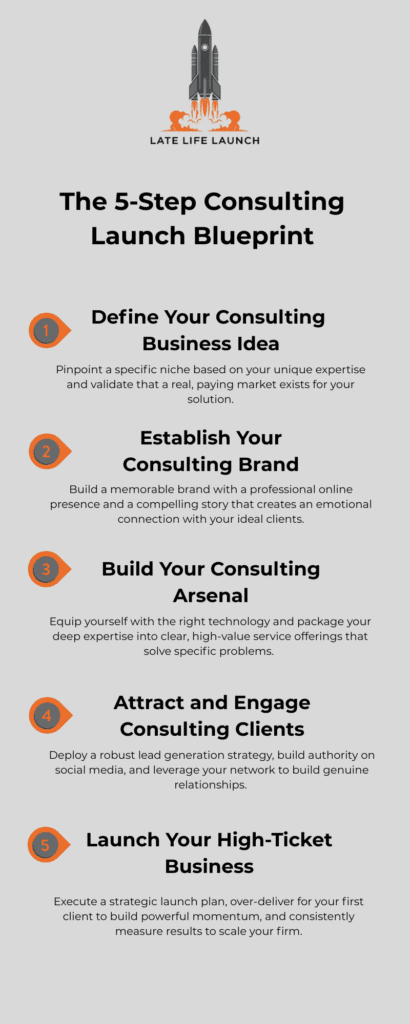Forget the myths; your age and experience aren’t liabilities, they’re your launchpad to an incredibly successful consulting business. This is your blueprint to forging a high-ticket consulting business after 45, weaponizing your decades of wisdom into an unfair advantage. Prepare to unleash your legacy, transforming years of experience into a thriving new venture in strategy consulting. It’s time to redefine what’s possible and claim your place as a sought-after expert.
Understanding Your Unfair Advantage
Leveraging Experience as a Consultant
Your years of experience are your most valuable asset. You’re not starting from scratch; you’re entering the consulting industry with a wealth of knowledge that fresh-faced startups simply can’t match. This deep understanding of your field is the foundation upon which you’ll build your consulting business. Don’t underestimate the power of lessons learned, mistakes overcome, and the nuanced insights you’ve gained as a business owner in strategy consulting. These will help you become a consultant and scale your new business. It’s time to capitalize on that experience.
Building Trust Through Your Network
Your existing network is your goldmine. These aren’t just casual acquaintances; they’re potential consulting clients, referral sources, and invaluable advisors. Nurture these relationships, letting them know about your exciting new venture to start a consulting business. This is a crucial step in business development. By leveraging your network, you’re establishing instant credibility and trust, bypassing the uphill battle faced by those starting a new business without established connections. Don’t forget about your business card!
Transforming Age into a Strategic Asset
Older entrepreneurs are statistically more likely to achieve consulting success. Your age isn’t a disadvantage; it’s a strategic asset. It signifies experience, stability, and a proven track record, instilling confidence in consulting clients. MBB companies are even embracing more specialized models, creating more roles for experienced professionals. Don’t let anyone tell you your time has passed. Your main event is just beginning, and the consulting industry is waiting for your unique expertise. It’s your vitality, your uncapped potential, not your limitations, that define you.

The First Step: Define Your Consulting Business Idea
Identifying Your Niche in the Consulting Industry
Pinpoint your niche. Become a specialist, the go-to consultant for a specific problem or industry. Your experience is your guiding star here. What type of consulting aligns perfectly with your unique expertise and passion? Avoid the temptation to be a generalist; instead, become a specialist, the go-to management consultant for a specific problem or industry. Perhaps your background lies in risk management, or maybe you have deep knowledge of management consulting. The more specific your focus, the easier it is to attract consulting clients willing to pay a premium for your targeted consultant service. Identify your niche and forge your consulting success.
Crafting a Unique Value Proposition
Craft a unique value proposition that sets your consulting business apart from the competition. Once you’ve identified your niche, craft a unique value proposition that sets your consulting business apart from the competition. What specific benefits do you offer that others don’t? How can you provide exceptional consulting services? What problems do you solve, and how do you solve them better than anyone else in the consulting industry? Think in terms of tangible results, quantifiable improvements, and lasting impact. A powerful value proposition communicates the value you bring to consulting clients, making it easier to attract and retain them. This is the cornerstone of any successful business, especially when starting your own consulting business.
Validating Your Business Idea with Market Research
Validate your business idea with thorough market research to ensure a successful start for your consultant business. Before diving headfirst into starting a business, rigorously validate your business idea with thorough market research tailored to your consultant business. Is there a real need for your consulting service? Are potential consulting clients willing to pay for your expertise? Research your target market, analyze the competition, and identify any potential challenges or obstacles. Utilize case studies from the consulting industry to see which niches are thriving. A robust business plan will provide critical insights and help you make informed decisions about your new business, increasing your chances of consulting success. Don’t skip this step. It’s the key to minimizing risk and maximizing your potential for a successful consulting business.
The Second Step: Establishing Your Consulting Brand
Choosing a Business Name That Resonates
Choose a business name that reflects your niche, your values, and your unique value proposition. Selecting the right business name for your consulting business is more than just aesthetics; it’s about crafting an identity that resonates with your target consulting client. Your business name should reflect your niche, your values, and the unique value proposition you offer as a consultant. Avoid generic names; instead, opt for something memorable, easy to pronounce, and relevant to the consulting industry. Once you decide on your business name, secure the domain name and relevant social media handles to protect your brand and aid business development.
Creating an Impactful Online Presence
Your website must be professional, informative, and easy to navigate. In today’s digital age, your online presence is often the first impression you make on potential consulting clients. Studies show that a significant percentage of people research a company’s online presence before making contact. Therefore, your website must be professional, informative, and easy to navigate, effectively showcasing your expertise, consulting service, and unique value proposition. Invest in high-quality content that demonstrates your knowledge and builds trust with your audience. It’s a critical part of business development. Leverage SEO strategies to ensure your consulting company appears prominently in search results and attracts the right consulting clients. A strong online presence is an essential component of any successful business venture.
Developing a Compelling Brand Story
Develop a compelling brand story that humanizes your consulting business. A compelling brand story humanizes your consulting business and creates an emotional connection with potential consulting clients, enhancing your marketing strategies. Share your journey, your “why,” and the values that drive your work as a consultant. Highlight the challenges you’ve overcome, the lessons you’ve learned, and the impact you’ve made in the consulting industry. A well-crafted brand story not only differentiates you from the competition but also inspires trust and loyalty. Show the world you have what it takes to start a successful business.
The Third Step: Building Your Consulting Arsenal
Essential Tools and Technology for Consultants
Equip yourself with the right tools and technology for efficient operation. To efficiently run your business and deliver exceptional consulting services, you’ll need to equip yourself with the right tools and technology. This might include project management software, CRM systems, communication platforms, and financial management tools. Investing in these resources streamlines your workflow, improves collaboration, and enables you to deliver results efficiently. Select tools that align with your specific needs and budget, and invest time in learning how to use them effectively. Choosing the right tools can make or break your consulting success.
Creating Your Service Offerings
Here’s how to package your expertise effectively. Define your service offerings with clarity and precision. You should consider:
- What specific problems do you solve?
- What deliverables do you provide to the consulting client?
Consider offering different tiers of service, ranging from basic consulting to comprehensive, high-touch support. Communicate the value proposition of each service offering, highlighting the tangible benefits and outcomes that consulting clients can expect. This strategic approach sets the stage for a successful business.
Setting Up Risk Management Strategies
Implement robust risk management strategies to protect your consulting business. Starting a business requires implementing robust risk management strategies to protect your consulting business from potential liabilities. This includes obtaining appropriate insurance coverage, drafting ironclad contracts, and implementing sound financial practices. You must also establish clear policies and procedures for managing client expectations, resolving disputes, and protecting confidential information as a business owner. Proactive risk management safeguards your consulting firm from unforeseen challenges and ensures the long-term sustainability of your consulting company. This helps you avoid common new business mistakes.
The Fourth Step: Attracting and Engaging Consulting Clients
Developing a Lead Generation Strategy
Develop a robust lead generation strategy. To thrive in the competitive consulting industry, a robust lead generation strategy is paramount for any consultant. Start by identifying your ideal consulting client, understanding their pain points, and determining where they spend their time online and offline. Develop targeted content that addresses their needs and showcases your expertise in business strategy. Utilize a mix of inbound and outbound tactics, such as content marketing, social media engagement, and direct outreach. Implement a lead capture system to nurture potential consulting clients through the sales funnel, increasing the chances of converting them into paying customers for your new business. This is a critical element of your business strategy plan.
Networking Effectively in the Consulting Community

Networking is the lifeline of any thriving consulting business. Networking is the lifeline of any thriving consulting business. Attend industry events, join relevant online communities, and actively participate in discussions. Seek out opportunities to connect with potential consulting clients, referral partners, and mentors. When networking, focus on building genuine relationships rather than simply pitching your consulting service. Offer value, share your expertise, and be a good listener. Remember, networking is a two-way street. By nurturing relationships and building a strong network, you will dramatically increase your visibility and attract more consulting clients to your small business.
Utilizing Social Media to Build Authority
Use social media to build authority and attract clients. Social media platforms are potent tools for building authority and attracting consulting clients. Select the platforms where your target audience spends the most time and focus your efforts there. Share valuable content, engage in conversations, and showcase your expertise as a management consultant. Use case studies to demonstrate your impact and build credibility. Consistently post relevant and informative content that positions you as a thought leader in your niche, and you will become a successful business. Remember, social media is about building relationships, not just broadcasting your message. Interact with your followers, respond to comments, and create a community around your brand. This approach will help you start a career in consulting.
The Fifth Step: Launching Your High-Ticket Consulting Business
Creating a Launch Plan for Success
Create a well-defined launch plan. A well-defined launch plan is crucial for maximizing your chances of consulting success and securing your first consulting client. Start by setting clear and measurable goals for your new business, such as the number of clients you want to acquire or the revenue you want to generate as a small business owner. Then, create a detailed timeline outlining the key milestones and activities required to achieve those goals. Identify your target market, develop your marketing materials, and plan your outreach strategy. A comprehensive launch plan will keep you on track and focused on the activities that will drive results for your consulting company.
Strategies for Your First Client Engagement
Over-deliver on your promises to exceed expectations. Your first client engagement sets the tone for your entire consulting business. Before you start consulting, clearly define the project scope, objectives, and deliverables. Communicate expectations upfront and ensure alignment with your consulting client to enhance your business strategy. Over-deliver on your promises, go the extra mile to exceed their expectations, and provide exceptional service. Building a strong relationship with your first client is crucial for securing referrals and testimonials, which will help you attract new business to your management consultant practice. Make your consulting service worth talking about by exceeding expectations and creating a positive and memorable experience for your consulting client. Starting a business with a positive first impression is key.
Measuring Success and Scaling Your Consulting Firm
To ensure the long-term success of your consulting firm, you must consistently measure your results and identify areas for improvement. This involves tracking key metrics, such as:
- Client satisfaction
- Revenue
- Profitability is a key focus for any small business owner looking to succeed in their consultant business.
Analyze your data to identify what’s working well and what’s not. Implement changes based on your findings to optimize your processes, improve your service offerings, and increase your efficiency. Scaling your consulting business requires a strategic approach. You must focus on building a strong team, streamlining your operations, and expanding your reach to attract new clients to your consulting company, helping you run your business with confidence as a small business owner.

